Original title: "A historic week has passed, and the US stocks and Bitcoin have finally risen, but the market has completely changed! 》
Original author: Bao Yilong, Wall Street News
U.S. stock volatility rarely surpasses emerging markets and Bitcoin, while U.S. bonds, which have always been regarded as safe assets, has caused investors to question the wisdom of holding U.S. assets. UBS believes that once global risk-free interest rates fluctuate, it means that all markets will be disrupted. Analyst Ed Al-Hussainy pointed out incisively: "I'm not worried about recession, I'm worried about the financial crisis."
US stocks returned to the rally on Friday, and it seemed that market risk appetite sentiment recovered, but in fact investors have begun to question the security of US assets, especially the violent fluctuations in US bonds, which once again shrouded the fear of the financial crisis overwhelmed Wall Street.
In the past week, the yield on the 10-year U.S. Treasury bonds hit its biggest weekly jump in more than 20 years, while U.S. stocks plunged again. On the surface, the S&P 500 rose more than 5% weekly, U.S. Treasury yields returned to February levels, and Bitcoin closed higher, as if everything was normal.
However, it is disturbing that the simultaneous decline of US stocks, US bonds and the US dollar this week is a typical emerging market feature, rather than the performance of the world's safest assets. Especially this week, with such large fluctuations in US long-term bonds, the liquidity crisis seems to be right in front of us, which makes investors begin to question the wisdom of holding US assets. UBS Group chief strategist Banu Baweija even said:
This is so scary. We are redefining global risk-free rates, which will disrupt all markets if global risk-free rates fluctuate.
Rare in history, U.S. asset volatility surpasses emerging markets and Bitcoin
Trump's recent tariff policies not only hurt confidence in the U.S. economy, but also shake investors' trust in the direction of U.S. policy and dollar assets. Even by Wall Street's long historical standards, this week was a tragic trading week, with US stocks seemingly riding on a roller coaster, and the trend of US bonds and US dollar even suggesting that the US risk aversion status seems to be out of stock:
On Monday, due to the so-called misdemeanor tariff news, the US stock market staged a 15-minute pulse shock. The Nasdaq once pulled 10% at a low level, and the US bonds plunged.
On Tuesday, news that there would be no tariff exemption shattered hopes of US stocks rebound, the Dow Jones Industrial Average dropped by more than 2,000 points in the intraday high, S&P smoothed out more than 4%, and the U.S. Treasury market experienced a deleveraging sharp drop.
On Wednesday, the United States suspended some tariffs, with the three major U.S. stock indexes closing up at least nearly 8%, S&P hitting its biggest gain in 2008, with U.S. stock trading volume hitting an all-time high of 30 billion shares. Ten-year U.S. Treasury yields surged and fell.
Investors around the world fled U.S. assets, U.S. stocks, bonds and foreign exchanges were three times, with the Nasdaq falling by more than 4%, the dollar's biggest daily decline in two years, and gold highs.
On Friday, the Federal Reserve suggested that it might take action, and U.S. stocks rebounded and closed higher, but the decline in U.S. bonds and dollar warned that the United States' position as a safe haven paradise seems to be out of control.
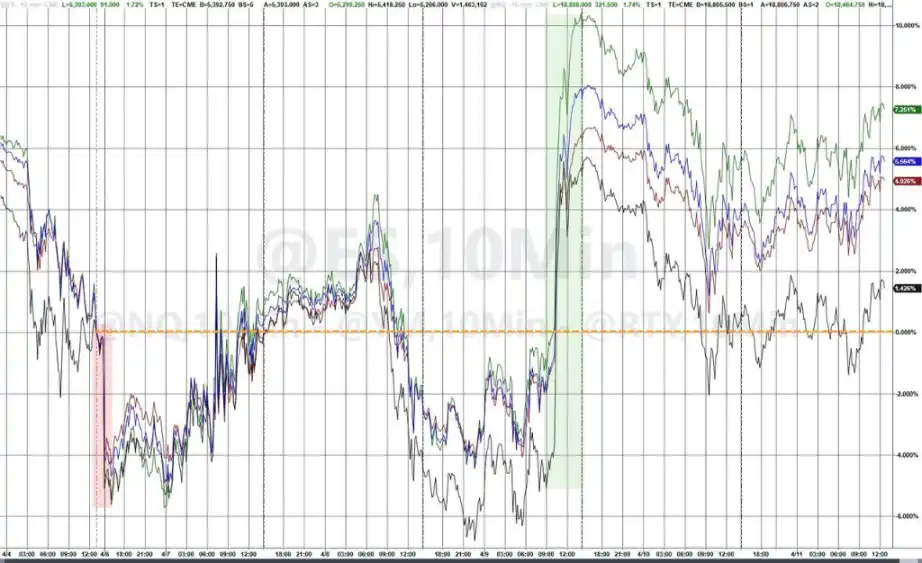
"Did the U.S. market start to behave like emerging markets? No doubt, yes, that's exactly what we're seeing," said Andrea DiCenso, investment manager at Loomis, Sayles & Company.
According to data, the volatility of US stock ETFs even exceeded that of funds tracking emerging markets, and was once higher than that of Bitcoin. This situation has almost never happened except for the epidemic, the crisis in August last year and the Fed's aggressive rate hike.
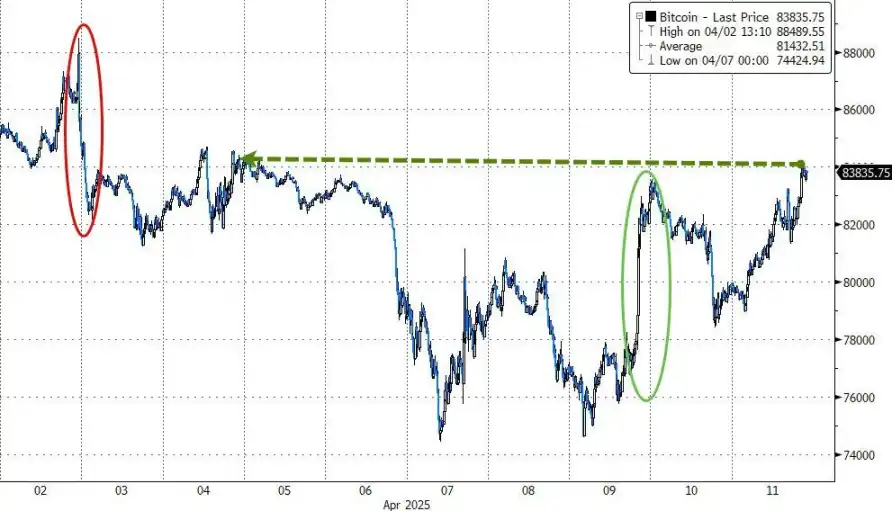
"The S&P 500 trades like a cryptocurrency, which may not be a good thing," Renaissance Capital's Neil Dutta said in an email to clients.
Risky fluctuations in risk-free interest rates indicate a recurrence of the financial crisis
When the long-term bond market fluctuates violently, interest rate spreads are huge and liquidity is low, it will affect all other capital markets, especially put upward pressure on interest rates and U.S. government debt, which may even turn into a financial crisis in the long run.
U.S. Treasury volatility jumped this week, with 20-year U.S. Treasury swelling quickly following VIX U.S. stock volatility.
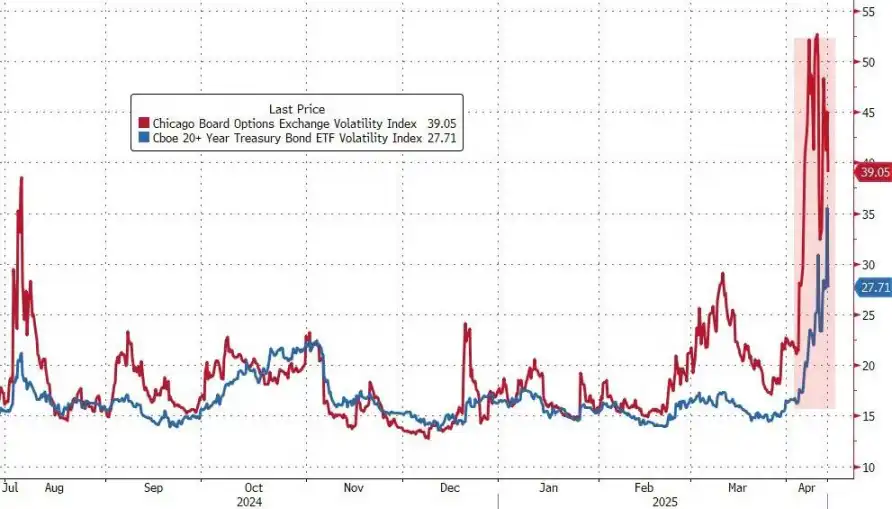
Although the 30-year U.S. Treasury decline did not continue last week, with a full-scale expansion, there were some cracks in the bid-ask spreads on benchmark 30-year bonds - a signal that the long-term liquidity of the Treasury yield curve was reduced. The spread has reached almost a full basis point this week, a level that hasn’t been seen since the beginning of 2023.
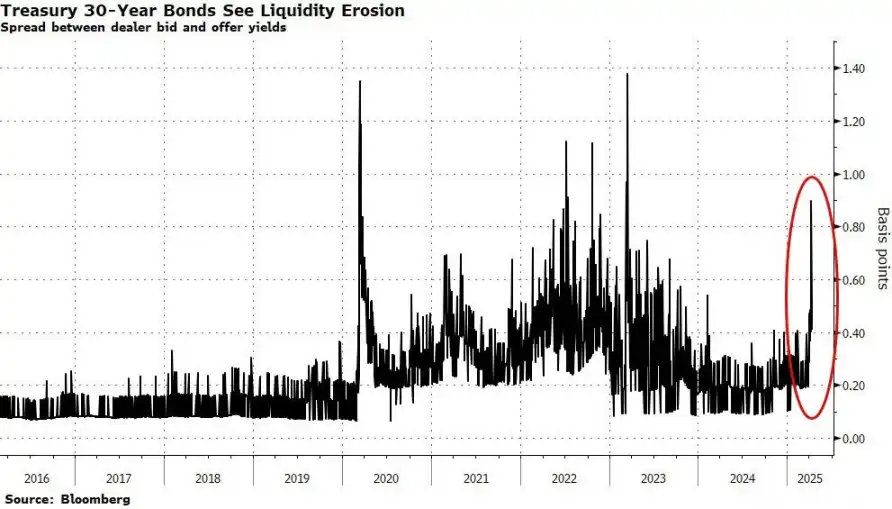
Confidence outside the United States in the quality of U.S. stocks, fixed income and monetary assets has been damaged. Fund Experience Nathan Thooft said, "The question is, is this a temporary shock or a long-term shift? We still believe in the former. But this cannot be denied that some large asset owners are looking for alternatives and diversified allocations to safe-haven assets."
Analyst Ed Al-Hussainy pointed out incisively:
I'm not worried about recession, I'm worried about the financial crisis.
Funds flock to safe-haven assets, Wall Street calls on Fed to intervene
The gloom of the financial crisis has caused global investors to withdraw from the United States and flock to safe-haven assets such as European bond markets, gold, yen and Swiss francs to avoid wider turmoil.
German bond yields remained largely unchanged this week, while U.S. 10-year bond yields soared by more than 50 basis points, the biggest magnitude since 1989 that U.S. Treasury yields lag behind German Treasury bonds. In contrast, the US dollar index fell below the 100 psychological mark, setting its worst two-week decline since November 2022, while the euro appreciated significantly against the US dollar, and the appreciation this week exceeded the yen.
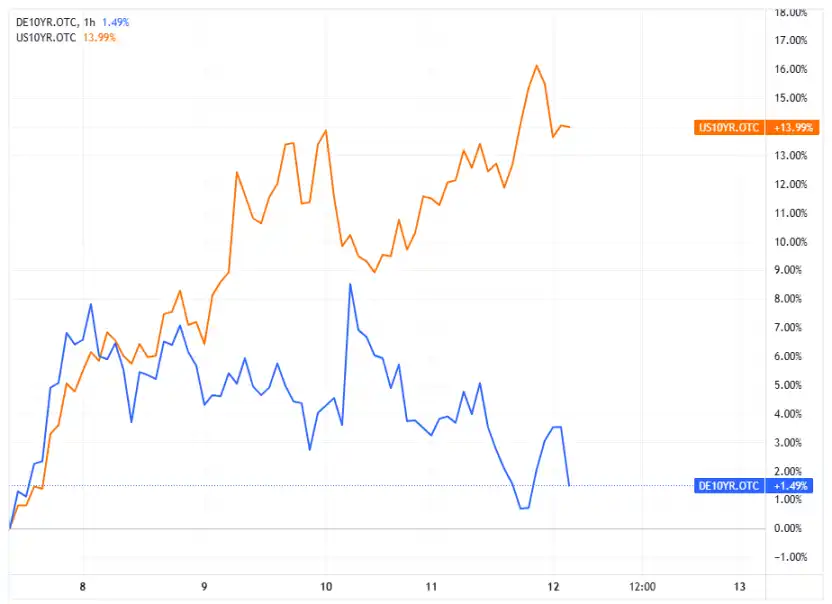
Extreme volatility has brought unprecedented psychological pressure to investors and traders, and Wall Street has voiced calls for the Federal Reserve to intervene. On Friday, JPMorgan Chase CEO Dimon said he expects "chaotic" in the U.S. Treasury market.
"When you have a lot of volatile markets, Treasury trading spreads are very wide and liquid, it affects all other capital markets," Dimon said on the earnings call. "This is the reason the Fed should intervene, not to help banks."
Thankfully, Fed voting committee member Susan Collins said Friday that if market conditions become chaotic, the Fed will "absolutely be ready" to help stabilize financial markets. But she also emphasized:
The market continues to run well and we don't see overall liquidity concerns.
















No comments yet